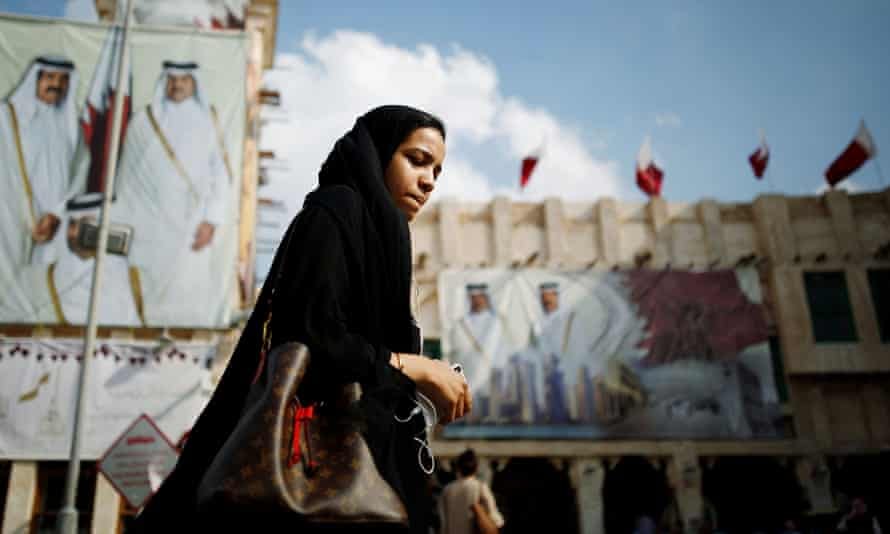Global Roundup: Sexual Violence in Tigray Region, Women vs Qatar Male Guardianship Laws, Yemeni Trans Man’s Story, British Schools' #MeToo, Indigenous Trans Artist Revitalizing Endangered Language
Compiled by Samiha Hossain
“My case is not unique,” said Mona Lisa. “I fought the soldier off. But there are so many women all over this region who were actually raped.” via .The New York Times
CW: sexual violence
The current civil war in the northern Ethiopian region Tigray has resulted in rampant sexual assault by soldiers targeting women and girls. Mona Lisa is an 18-year-old survivor of one such attempted rape. An Ethiopian soldier broke into her home and ordered her grandfather to rape her. When her grandfather refused, the soldier tried to rape Mona Lisa who fought back, kicking the soldier in the crotch and briefly grabbing his gun. He quickly overpowered her and left her with seven gunshot wounds and an amputated arm. She wants it to be known that she resisted.
There are hundreds of stories like Mona Lisa’s as a result of this civil war. According to a United Nations official, more than 500 Ethiopian women had formally reported sexual violence in Tigray – the actual number is undoubtedly higher.
This is ethnic cleansing. Soldiers are targeting Tigrayan women to stop them giving birth to more Tigrayans. – Mona Lisa
These sexual assaults are starting to garner international attention. Recently, President Joe Biden sent an envoy, Senator Chris Coons, Democrat of Delaware, to Ethiopia for talks with Ethiopia’s prime minister, Abiy Ahmed. Ahmed also addressed Ethiopia's Parliament and publicly acknowledged that sexual assault had become an integral part of a war that he once promised would be swift and bloodless.
Ahmed said he sent his soldiers to “destroy the junta”, referring to the Tigray People’s Liberation Front (T.P.L.F.), which ruled Ethiopia for three decades until he came to power in 2018. The T.P.L.F. then resorted to governing Tigray and now fight under a new name, the Tigray Defense Forces. The war began in November 2020 when Ahmed accused the T.P.L.F. of attacking a major military base in a bid to overthrow his government. Underlying this fight is “longstanding land disputes, opposing visions over the future shape of Ethiopia, and a rivalry with Eritrea going back decades” – women are however being subjected to atrocious forms of violence. Most of the sexual violence accusations in Tigray are against Ethiopian and allied Eritrean soldiers, but Tigrayan forces may be involved as well.
Rape is being used as a weapon of war. What’s happening is unimaginable – Letay Tesfay, Tigray Women’s Association
The widespread sexual violence is being exacerbated by a collapsing health system where many women are contracting sexually transmitted infections such as H.I.V. and demands for abortions and emergency contraceptives have risen. According to Doctors Without Borders, there is a concerted effort by the soldiers to destroy Tigray’s health care system. A doctor specialized in sexual assault in Ayder Referral Hospital in Mekelle says he received at least three new patients every day since Ethiopian troops marched into Mekelle in November. He also produced a list of 18 registered sexual violence patients at the hospital, the youngest being 14-years-old. The accounts likely do not show the full extent of the severity of what is happening, as officials are reluctant to register the violence due to fears that the military could target them for documenting the crime.
The details of survivors’ assaults in this article are horrific. What is happening in Tigray is yet another instance where women and girls experience some of the worst violence as a result of conflict. It is crucial that other governments, rights groups and activists around the world stand in solidarity with survivors in Tigray and demand that immediate action is taken to prevent these sexual assaults and hold soldiers accountable for their crimes.
------------------------------------------------------------------------------------------------------
A young woman at a marketplace in Doha, Qatar. Photograph: Corinna Kern/Reuters
A Human Rights Watch (HRW) report that examined 27 laws covering work, accommodation and status in Qatar concluded that women in Qatar are living under “deep discrimination” and must obtain permission from their male guardians for permission to marry, travel, pursue higher education or make decisions about their own children. The government maintains that the HRW report is “inaccurate” and unrepresentative of the country’s “constitution laws or policies''. They also promised to investigate all the cases mentioned and prosecute anyone who has broken the law. Qatari women’s accounts tell a different story however.
Girls are [constantly] in quarantine. What the whole world experiences now, this is normal life for girls in Qatar. – Qatari woman
According to Rothna Begum, senior women's rights researcher at HRW, a motivator of the study was that women were left unaware of rules and any changes to the law. In addition, several different institutions ask women to prove male permission even though it is not in the legislation. Women reported being asked for proof of marriage to access some sexual and reproductive healthcare, antenatal care, vaginal ultrasounds and smear tests. Since Qatar has no anti-discrimination laws, there are no agencies at which to complain and no groups to monitor how women are treated or hold the government accountable.
The government in Qatar don’t want women to know the rules. They want men to have power and control. So if laws are changed, the government don’t inform women and when they introduce restrictions they don’t tell them that clearly, either. These laws exist in a nefarious way and women have to base decisions on an assumption that they must be obedient to men – Rothna Begum
Women find it hard to speak out about gender discrimination in the country. In 2019, 21-year-old Noof al-Maadeed decided to leave Qatar and claim asylum in the UK after years of domestic abuse and restrictions. Unmarried Qatari women under the age of 25 are prohibited from travelling abroad without the permission of their male guardian. The social media outcry from al-Maadeed’s public escape resulted in the government lifting the requirement on women to have a guardian’s permission to obtain driving licenses in 2020. Begum believes international pressure will help bring about change in the country.
I am optimistic because women have been vocal. Women are sick of it, younger women are very frustrated and this is a modern country, women are highly educated in many cases. With the World Cup coming, there will be a lot of focus on rights there, exposure will help. – Rothna Begum
The patriarchy continues to treat women like children, as it is adamant on controlling women’s every move. Acts of resistance like that of Noof al-Maadeed make it clear that women will not accept this patriarchal fuckery and demand their full rights and autonomy be recognized.
------------------------------------------------------------------------------------------------------
Yahyia Al-Zindani lives under the threat of a so-called ‘honour’ killing. Photo courtesy of Yahyia Al-Zindani via Open Democracy
CW: transphobia
I miss Yemen. I miss home and I miss my family so bad, even though they hate me and they would kill me if I go back. But I still love them and it hurts to miss them while they are hating me this bad. I miss my friends and I miss being not afraid of anything, knowing that my family has my back. But now I have no one - Yahiya Al-Zindani
The abuse from his family included jailing him against his will in a mental institution, giving him antipsychotic and female hormones by force, and his father threatening to kill him and reporting him to the Houthi militia, the forces that run much of the war-divided country.
I was labelled a schizophrenic, bipolar, paranoid and an aggressive person. All my medical reports were switched to suit my family’s claims of insanity and to label me as incompetent and unable to make my own decisions. I was put under their forced guardianship - Yahiya Al-Zindani
The abuse also prevented him from achieving his dream of graduating medical school and the drugs have permanently affected his memory. Human rights activists and friends have helped him get the necessary documents, ID and passport to finally leave Yemen for another country in the Middle East, though the pandemic has delayed his plans for relocating out of the Middle East.
Al-Zindani is a gender equality and LGBTQIA+ rights advocate and dreams of making conditions better for his community in Yemen. Though he can speak on social media, he feels restricted being isolated to only that medium.
I dream of relocating to a country where I can safely express my thoughts and my identity, where my inalienable human rights are respected and where my voice can create the change that our community needs, so that the rest of us don’t disappear into thin air - Yahiya Al-Zindani
According to two Australian academics, modern transphobia within Islam does not have a basis in traditional teaching and was imported from colonialism. However, trans people across Muslim countries face horrific violence rooted in transphobia from their families, society and culture. Despite the hardships Al-Zindani has faced and continues to face, he is vocal about his experiences and passionate about supporting his community and creating a world where people like him can exist freely and without fear.
------------------------------------------------------------------------------------------------------
Soma Sara, the 22-year-old who started the "Everyone's Invited" website on which teenagers have been posting accounts of sexual harassment and abuse, sits of a portrait in London, Britain, March 29, 2021. Picture taken March 29, 2021. REUTERS/Dylan Martinez
CW: sexual violence
There has been a #MeToo movement in schools in Britain where over 10,000 teenagers have recounted their experiences of sexual harassment and abuse. They anonymously posted these stories on a website called “Everyone’s Invited”.
Everyone’s Invited was started by 22-year-old Soma Sara due to her experiences of rape culture in her teenage years.
I'm talking about when behaviour that's not normal is normalised, so something like groping at a Christmas party, or non-consensual sharing of intimate photos, or derogatory sexist comments. When those things are normalised they can actually act as a gateway to more extreme acts and criminal acts such as sexual assault and rape. – Soma Sara
The stories on the website include a 14-year-old girl waking up with someone’s penis in her mouth while she was passed out drunk, a girl’s boyfriend sharing her nude photos and a girl’s boyfriend pushing her head towards his crotch while they were kissing. There are also some accounts of boy-on-boy, girl-on-girl and girl-on-boy abuse. Authorities have expressed concerns and say if the gravest incidents described are confirmed, they could constitute criminal offences including assault and rape.
Girls and young women taking control of the narrative and posting their stories defies rape culture, which tries to force survivors into shame and silence. Yet, it is deeply disturbing that so many young people, particularly girls, have experienced sexual abuse. More must be done to fight against misogyny and patriarchy to ensure that no young person has to live in a world where they might be sexually abused.
------------------------------------------------------------------------------------------------------
Image via Global Voices
Petrona Xemi Tapepechul is an indigenous transgender woman who seeks to unite the Nawat language speakers and transgender people through her creative work. Nawat is a nearly extinct native language spanning from Mexico to Costa Rica belonging to the Nahuatl dialect group. Today, it is mainly spoken by a few indigenous elders who live in western El Salvador.
The Nahuat or Nawat, lost a great part of their population due to an ethnocide at the hands of the military dictatorship of Maximiliano Hernández Martínez in 1932 where up to 30,000 indigenous and peasant people were massacred.
After Xemi left her native “Kuskatan” (El Salvador in Nawat), she became an activist and leader in Washington D.C.'s transgender community. She founded a group called Angel Rose Artist Collective – a two-spirit theatre troupe that celebrates the members’ indigenous ancestors and honors themselves as transgender people through art.
We created the collective to urge the D.C. theatre community to stop erasing indigenous artists, traditions, and histories. Also, to uplift Washington DC's two-spirit indigenous and transgender communities - Xemi
She is also a part of the movement that is trying to revitalize Nawat among young people. The collective's language classes are for transgender people and cisgender people who support the trans community.
We opened our virtual school intending to create alternative spaces for Trans, Queer, English-speaking, and migrant communities in the Diaspora and El Salvador. Many virtual spaces for learning the Nawat language are transmisogynistic, anti-indigenous, and only [taught] in Spanish - Xemi
Xemi’s accomplishments are incredibly uplifting. It is important to recognize the vitality of revitalizing almost extinct languages and the role trans and two spirit people play in doing so.
——————————————————————————————————————
Samiha Hossain (she/her) is a student at the University of Ottawa. She has experience working with survivors of sexual violence in her community, as well as conducting research on gender-based violence. A lot of her time is spent learning about and critically engaging with intersectional feminism, transformative justice and disability justice.
Samiha firmly believes in the power of connecting with people and listening to their stories to create solidarity and heal as a community. She refuses to let anyone thwart her imagination when it comes to envisioning a radically different future full of care webs, nurturance and collective liberation.






